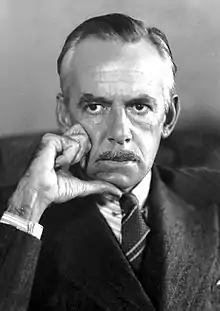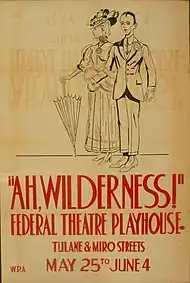1936 Nobel Prize in Literature
The 1936 Nobel Prize in Literature was awarded to the American playwright Eugene O'Neill "for the power, honesty and deep-felt emotions of his dramatic works, which embody an original concept of tragedy". The prize was awarded in 1937.[1] He is the second American to become a literature laureate after Sinclair Lewis in 1930.
| Eugene O'Neill | |
 "for the power, honesty and deep-felt emotions of his dramatic works, which embody an original concept of tragedy" | |
| Date |
|
| Location | Stockholm, Sweden |
| Presented by | Swedish Academy |
| First awarded | 1901 |
| Website | Official website |
Laureate
Influenced by the realist playwrights Chekhov, Strindberg and Ibsen, Eugene O'Neill is regarded as the foremost American dramatist of the 20th century. His plays were among the first to include speeches in American English vernacular and involve characters on the fringes of society who struggle to maintain their hopes and aspirations, but ultimately slide into disillusion and despair. He was awarded the Pulitzer Prize three times, first for Beyond the Horizon (1920), his debut play, followed by Anna Christie in 1922 and Strange Interlude in 1928. Mourning Becomes Electra (1931) and the posthumous Long Day's Journey into Night is regarded as two masterpieces in a long string of plays.[2][3]

Deliberations
Nominations
Eugene O'Neill was nominated for the prize three times, in 1934, 1935, and 1936.[4] In 1936 the Nobel committee received 47 nominations for 27 individuals including Paul Valéry, António Correia de Oliveira, Miguel Unamuno, Kostis Palamas, Olav Duun, Jarl Hemmer, Karel Capek, Benedetto Croce, Roger Martin du Gard (awarded in 1937) and Johannes V. Jensen (awarded in 1944). Ten were newly nominated such as Georges Duhamel, Ludwig Klages, Sigmund Freud, Cécile Tormay, Enrica von Handel-Mazzetti and Arvid Mörne. Most nominations were submitted for the Finnish author Frans Emil Sillanpää (awarded in 1939) with five nominations, including two nominations suggesting a shared prize with Jarl Hemmer and Arvid Mörne respectively. Only two women were nominated namely Cécile Tormay Tormay and Enrica von Handel-Mazzetti.[5]
The authors Juliette Adam, Jacques Bainville, Mateiu Caragiale, James Churchward, Eugène Dabit, Adolf de Herz, Teresa de la Parra, Ramón del Valle-Inclán, Stefan Grabiński, Federico García Lorca, A. E. Housman, M. R. James, Kitty Lee Jenner, Dezső Kosztolányi, Mikhail Kuzmin, Mourning Dove, Elizabeth Robins Pennell, Kristína Royová, Moritz Schlick, Jan Jacob Slauerhoff, Oswald Spengler, Dhanpat Rai Srivastava (known as Premchand), Heinrich Rickert, Ferdinand Tönnies, Lidia Veselitskaya and Zhou Shuren (known as Lu Xun) died in 1936 without having been nominated for the prize.
| No. | Nominee | Country | Genre(s) | Nominator(s) |
|---|---|---|---|---|
| 1 | Hari Mohan Banerjee (d. 1960) | essays | Devadatta R. Bhandarkar (1875–1950) | |
| 2 | António Correia de Oliveira (1878–1960) | poetry | Luís da Cunha Gonçalvez (1875–1956) | |
| 3 | Benedetto Croce (1866–1952) | history, philosophy, law | Julius von Schlosser (1866–1938) | |
| 4 | Karel Čapek (1890–1938) | drama, novel, short story, essays, literary criticism | several professors[lower-alpha 1] | |
| 5 | Miguel de Unamuno (1864–1936) | novel, poetry, philosophy, essays, drama |
| |
| 6 | Asis Domet (1890–1943) | essays, translation | G. E. Khoury (?) | |
| 7 | Roger Martin du Gard (1881–1958) | novel, drama, memoir | Torsten Fogelqvist (1880–1941) | |
| 8 | Georges Duhamel (1884–1966) | novel, short story, poetry, drama, literary criticism | Hjalmar Hammarskjöld (1862–1953) | |
| 9 | Olav Duun (1876–1939) | novel, short story |
| |
| 10 | Alfred Edward Evershed (1870–1941) | essays, pedagogy | Elias Edward Miller (1878–1937) | |
| 11 | Hans Fallada (1893–1947) | novel, short story | Martin Lamm (1880–1950) | |
| 12 | Sigmund Freud (1856–1939) | essays | ||
| 13 | Jarl Hemmer (1893–1944) | poetry, novel |
| |
| 14 | Johannes Vilhelm Jensen (1873–1950) | novel, short story, essays |
| |
| 15 | Ludwig Klages (1872–1956) | philosophy, poetry, essays | Wilhelm Pinder (1878–1947) | |
| 16 | Erwin Guido Kolbenheyer (1878–1962) | novel, short story, poetry, drama | Hans-Friedrich Rosenfeld (1899–1993) | |
| 17 | Dmitry Merezhkovsky (1865–1941) | novel, essays, poetry, drama | Sigurd Agrell (1881–1937) | |
| 18 | Arvid Mörne (1876–1946) | poetry, drama, novel, essays | Gunnar Landtman (1878–1940)[lower-alpha 3] | |
| 19 | Eugene O'Neill (1888–1953) | drama | Henrik Schück (1855–1947) | |
| 20 | Kostis Palamas (1859–1943) | poetry, essays |
| |
| 21 | Sarvepalli Radhakrishnan (1888–1975) | philosophy, essays, law | Hjalmar Hammarskjöld (1862–1953) | |
| 22 | Frans Eemil Sillanpää (1888–1964) | novel, short story, poetry |
| |
| 23 | Hermann Stehr (1864–1940) | novel, short story, poetry, drama | Hermann August Korff (1882–1963) | |
| 24 | Cécile Tormay (1875–1937) | novel, short story, essays, translation |
| |
| 25 | Paul Valéry (1871–1945) | poetry, philosophy, essays, drama |
| |
| 26 | Edvarts Virza (1883–1940) | poetry, essays, translation |
| |
| 27 | Enrica von Handel-Mazzetti (1871–1955) | novel, poetry, essays |
|
Prize decision
In 1936, the Nobel Committee shortlisted Sigmund Freud, Eugene O'Neill and Paul Valéry. During the deliberations, the committee found a tight contest between O'Neill and Freud, who was nominated by his friend, Nobel laureate Romain Rolland. But Freud, rejected already several times for the Nobel Prize in Physiology or Medicine, was later on dismissed for his "sick and distorted imagination."[6] Valéry was also dismissed for his "exclusive and obscure poetry" while O'Neill's works like Anna Christie and Mourning Becomes Electra were praised, but the committee finds that they still needed further evaluation hence the committee decided that none of this year's nominations met the criteria as outlined in the will of Alfred Nobel. According to the Nobel Foundation's statutes, the Nobel Prize can in such a case be reserved until the following year, and this statute was then applied, and the 1936 Nobel Prize in Literature was awarded the following year.[1][7][6]
Banquet speech
Because of the state of his health, Eugene O'Neill was unable to travel to Stockholm to receive the prize. But he delivered a speech that was read by the American chargé d'affaires at the banquet in Stockholm City Hall. In the speech, O'Neill paid tribute to the Swedish dramatist August Strindberg and the great influence Strindberg had on his work.[8]
Notes
- Several professors of history and history of literature from the Prague, Czech Republic.
- Miguel de Unamuno y Jugo was nominated by J. Ramos Loscertales, F. Maldonado, J. Camón Aznar and M. Garcia Blanco, with approval from 6 other professors, all from Salamanca University.
- G. Landtman suggested the Nobel Committee to award F. Sillanpää alone. His second suggestion, to share the prize with Sillanpää, was J. Hemmer or A. Mörne.
- Valéry was nominated jointly by J. Bidez and J. Salverda de Grave, both member of the Royal Netherlands Academy of Arts and Sciences
- E. Virza was nominated by L. Bērziņš and F. Balodis
- E. von Handel-Mazzetti was jointly nominated by J. Nadler and M. Enzinger
References
- "The Nobel Prize in Literature 1936". nobelprize.org.
- "Eugene O'Neill". britannica.com.
- Eugene O'Neill – Facts nobelprize.org
- "Nomination archive - Eugene O'Neill". nobelprize.org.
- "Nomination archive - Literature 1936". nobelprize.org. April 2020.
- The Nobel Prize in Literature: Nominations and Reports 1901–1950 nobelprize.org
- Gustav Källstrand Andens Olympiska Spel: Nobelprisets historia, Fri Tanke 2021
- "Banquet speech". nobelprize.org.
External links
- Award ceremony speech by Per Hallström
- Banquet speech by Eugene O'Neill